

HTTrack Website Copier - Aspirateur de sites web libre (GNU GPL) Web scraping. Web scraping, web harvesting, or web data extraction is data scraping used for extracting data from websites.[1] Web scraping software may access the World Wide Web directly using the Hypertext Transfer Protocol, or through a web browser.
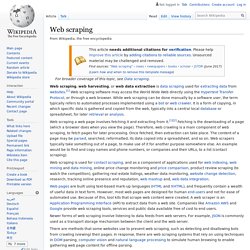
While web scraping can be done manually by a software user, the term typically refers to automated processes implemented using a bot or web crawler. It is a form of copying, in which specific data is gathered and copied from the web, typically into a central local database or spreadsheet, for later retrieval or analysis. Web scraping a web page involves fetching it and extracting from it.[1][2] Fetching is the downloading of a page (which a browser does when you view the page).
Therefore, web crawling is a main component of web scraping, to fetch pages for later processing. Once fetched, then extraction can take place. Download entire website or download web pages with SurfOffline - convenient website downloader with easy-to-use interface. Le logiciel libre moteur de recherche. Building An Open Source, Distributed Google Clone. Disclosure: the writer of this article, Emre Sokullu, joined Hakia as a Search Evangelist in March 2007.
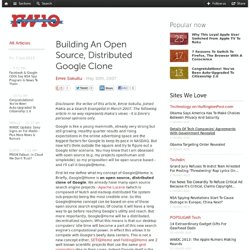
The following article in no way represents Hakia's views - it is Emre's personal opinions only. Google is like a young mammoth, already very strong but still growing. Healthy quarter results and rising expectations in the online advertising space are the biggest factors for Google to keep its pace in NASDAQ. But now let's think outside the square and try to figure out a Google killer scenario. You may know that I am obsessed with open source (e.g. my projects openhuman and simplekde), so my proposition will be open source based - and I'll call it Google@Home. First let me define what my concept of Google@Home is. Comparison to Wikiasari The distributed nature of the engine is what makes it different from Wikipedia co-founder Jimmy Wales' Wikiasari project, which is an open source wiki-inspired search engine.
YaCy. Access to the search functions is made by a locally running web server which provides a search box to enter search terms, and returns search results in a similar format to other popular search engines.
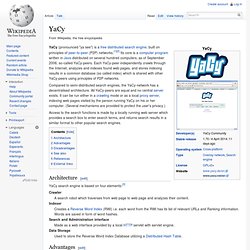
Architecture[edit] Distributed web crawling. Distributed web crawling is a distributed computing technique whereby Internet search engines employ many computers to index the Internet via web crawling. Such systems may allow for users to voluntarily offer their own computing and bandwidth resources towards crawling web pages. By spreading the load of these tasks across many computers, costs that would otherwise be spent on maintaining large computing clusters are avoided.[1] Types[edit] Cho and Garcia-Molina[2] studied two types of policies: Dynamic assignment[edit] With this type of policy, a central server assigns new URLs to different crawlers dynamically.
With dynamic assignment, typically the systems can also add or remove downloader processes. There are two configurations of crawling architectures with dynamic assignments that have been described by Shkapenyuk and Suel:[3] Majestic-12: Distributed Search Engine. Distributed Search Engines, And Why We Need Them In The Post-Snowden World. FAROO Search. CommonCrawl. Nonprofit Common Crawl Offers a Database of the Entire Web, For Free, and Could Open Up Google to New Competition. Google famously started out as little more than a more efficient algorithm for ranking Web pages.
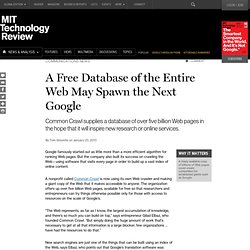
But the company also built its success on crawling the Web—using software that visits every page in order to build up a vast index of online content. A nonprofit called Common Crawl is now using its own Web crawler and making a giant copy of the Web that it makes accessible to anyone. The organization offers up over five billion Web pages, available for free so that researchers and entrepreneurs can try things otherwise possible only for those with access to resources on the scale of Google’s. “The Web represents, as far as I know, the largest accumulation of knowledge, and there’s so much you can build on top,” says entrepreneur Gilad Elbaz, who founded Common Crawl. “But simply doing the huge amount of work that’s necessary to get at all that information is a large blocker; few organizations … have had the resources to do that.” How to crawl a quarter billion webpages in 40 hours. More precisely, I crawled 250,113,669 pages for just under 580 dollars in 39 hours and 25 minutes, using 20 Amazon EC2 machine instances.
I carried out this project because (among several other reasons) I wanted to understand what resources are required to crawl a small but non-trivial fraction of the web. In this post I describe some details of what I did. Of course, there’s nothing especially new: I wrote a vanilla (distributed) crawler, mostly to teach myself something about crawling and distributed computing. Still, I learned some lessons that may be of interest to a few others, and so in this post I describe what I did. The post also mixes in some personal working notes, for my own future reference.
Webbot - the W3C Libwww Robot. Internet search engine software. ASPseek: free search engine software. MySpiders. DataparkSearch Engine - an open source search engine. UBot Studio: Build Web Automation and Marketing Software. Spidering Hacks. Official Web Site: Webbots, Spiders, and Screen Scrapers, by Michael Schrenk. Webbots, Spiders, and Screen Scrapers. Webbots, Spiders, and Screen Scrapers is "unmatched to my knowledge in how it covers PHP/CURL.
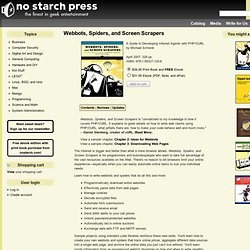
It explains to great details on how to write web clients using PHP/CURL, what pitfalls there are, how to make your code behave well and much more. " —Daniel Stenberg, creator of cURL (Read More) View a sample chapter, Chapter 2: Ideas for Webbots View a sample chapter, Chapter 3: Downloading Web Pages The Internet is bigger and better than what a mere browser allows.
Webbots, Spiders, and Screen Scrapers is for programmers and businesspeople who want to take full advantage of the vast resources available on the Web. Learn how to write webbots and spiders that do all this and more: Web mining. Répertoire des robots du web. Annuaire-info Bien plus qu'un annuaire d'annuaires !
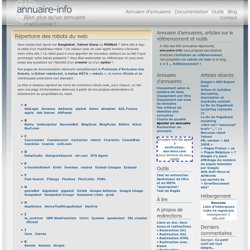
Annuaire d'annuaires Documentation Outils Blog. Internet bot. An Internet bot, also known as web robot, WWW robot or simply bot, is a software application that runs automated tasks over the Internet. Typically, bots perform tasks that are both simple and structurally repetitive, at a much higher rate than would be possible for a human alone. Elasticsearch Open Source Search Engine. Spider.io — the data layer of accurate analytics services. Search Tools - Enterprise Search Engines - Information, Guides and News.
Web Crawler, spider, ant, bot... how to make one? Introduction.
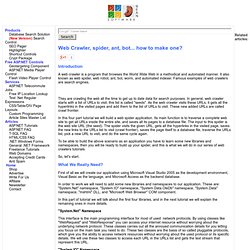
Smarter Bots by Internet Expert Marcus P. Zillman, M.S., A.M.H.A. Web crawler. Not to be confused with offline reader.
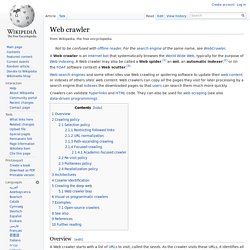
For the search engine of the same name, see WebCrawler. Crawlers can validate hyperlinks and HTML code. Les réseaux sociaux perméables aux robots voleurs de données. Les programmes permettant de simuler des comportements humains via des interfaces informatiques deviennent de plus en plus évolués.
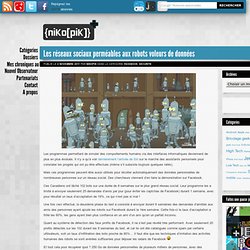
Il n’y a qu’à voir dernièrement l’arrivée de Siri sur le marché des assistants personnels pour constater les progrès qui ont pu être effectués (même s’il subsiste toujours quelques ratés). Mais ces programmes peuvent être aussi utilisés pour récolter automatiquement des données personnelles de nombreuses personnes sur un réseau social. Des chercheurs viennent d’en faire la démonstration sur Facebook. Ces Canadiens ont lâché 102 bots sur une durée de 8 semaines sur le plus grand réseau social.
Leur programme les a limité à envoyer seulement 25 demandes d’amis par jour (pour éviter les captchas de Facebook) durant 1 semaine, avec pour résultat un taux d’acceptation de 19%, ce qui n’est pas si mal ! Quant au système de détection des faux profils de Facebook, il ne s’est pas révélé très performant. Et tout cela pour récupérer quoi ?